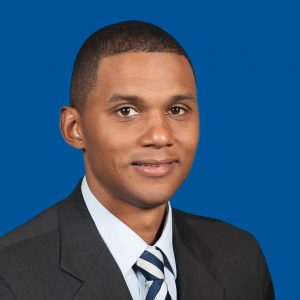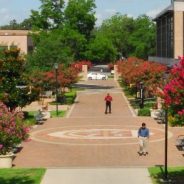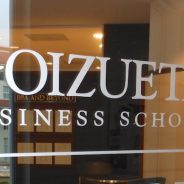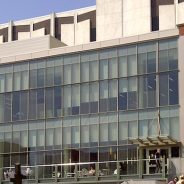Search results for return on investment:
Metro News & Notes: What Is A Pop-Up Business School?
Good morning and happy Friday!
Here are a few stories you may have missed from the week that was …
The Best Chicago Executive MBA Programs
Are you working professional in the Chicago metro who want to really start to climb the corporate ladder? Do you have significant managerial experience, but want to really take the next step and assume a leading roles in your organizations. Then an Executive MBA (EMBA) may be what you’re looking for. Continue reading…
UTA EMBA Program Ranked Among Best By CEO Magazine
The Executive MBA program at the University of Texas at Arlington – College of Business was recently ranked among the top programs in the world by CEO Magazine.
How Wharton Prepares MBA Graduates For The Workforce
Going back to business school to pursue an MBA is an important step to getting that high-paying dream job. However, the path to graduation and employment can be a little overwhelming for some. In order help students out and ultimately increase their likelihood of being hired post-grad, schools prepare their students for various careers and industries through internship programs, career services and counseling, hands-on projects and sprawling alumni networks.
5 Reasons You Should Get An Online MBA
It wasn’t too long ago that an Online MBA seemed like a skeptical investment. The concept of earning a legitimate MBA degree for a severely discounted price seemed impossible less than 10 years ago, especially with a gamut of “diploma mills” clogging the academic industry. Slowly, however, reputable schools like the Smith School of Business at the University of Maryland and the USC Marshall School of Business began implementing ultra-flexible online programs. The same degree that seemed like an outlier has quickly become a normal option for MBA students next to the more traditional full-time and part-time programs.
Continue reading…
Cambridge Judge MBAs Create New Energy Startups
The energy landscape is changing. Fossil fuels are on their way out as half of the global R&D in the energy field has become devoted to developing low carbon alternatives such as solar and wind. The good news is that besides helping the environment, this changing landscape also opens up many unique business opportunities. That’s why schools such as the University of Cambridge’s Judge Business School are helping students explore possible solutions with new energy startups. Continue reading…
St. Thomas Is Transforming Healthcare Business Education With The MCTM
Sponsored Content
At first glance, a career in medicine—whether in a laboratory, clinic, or hospital—and a career in business appear to have little in common. However, that’s not the case. According to the most recent 2016 mba.com Prospective Students Survey completed by the Graduate Management Admission Council, 8 percent of MBAs ended up with a job in Healthcare/Pharmaceuticals.
There’s just one problem with that. An MBA is a large commitment, and the cost can be too high for many potential candidates who have already gone through years of schooling to earn their MD or Ph.D. For others, the potential ROI of an MBA isn’t worth the time required to be spent outside of work.
The good news is there’s another option available from the University of St. Thomas Cameron School of Business: a Master’s in Clinical Translation Management (MCTM).
Master in Clinical Translation Management (MCTM)
“The MCTM program offered at the University of St. Thomas is truly one-of-a-kind,” said Dr. Beena George, Dean of the University of St. Thomas’ Cameron School of Business. “It is a technology commercialization program focused on the life sciences and is managed by a business school. Students get deep exposure to all facets of the clinical translation process because of our close collaboration with Houston Methodist Research Institute.”
What Is Clinical Translation Management?
So, what exactly is a Master’s in Clinical Translation Management? First, you need to understand clinical translation, which is the process of turning basic discoveries that occur in laboratories into usable drugs, medical devices, or clinical processes.
“This commercialization process is highly regulated and capital-intensive, and requires business expertise to achieve the desired goals,” explained Dr. George. “As an example, drug development can cost upwards of one billion dollars and take over ten years to reach the market, representing staggering investments in capital and human resources. Many of these development projects fail along the way, and pharmaceutical companies are raising the price tags in return for taking on higher risks. To avoid such failures and bring therapies and products to clinical use faster, a combination of scientific knowledge and business expertise is necessary.”
It’s a quickly growing field that requires a deep knowledge of biotechnology as well as business and regulatory savviness, all necessary to assess a product’s commercial potential and to navigate the pathway of clinical translation. “The MCTM program endows students with a solid understanding of the unmet needs of the biotech sector,” said Dr. George.
Where do Clinical Translation Manager’s Work?
There are many different types of organizations looking for people to fill their clinical translation needs. Examples include:
- Pharmaceutical and biomedical device firms such as GE Healthcare, Johnson & Johnson Innovation, and Medtronic, Inc.
- Technology transfer offices at research organizations
- Life sciences management consulting firms
As for the reason behind the program’s existence, “It responds to a global need to make the translational process faster and more efficient,” explained Dr. George. “It also addresses a regional need. Much research in the life sciences area is done at and near the Texas Medical Center and in Houston. The business/commercialization talent required to support the development of a life sciences industry in this region would contribute positively to the economy.”
Who Should Apply for the MCTM Program?
The MCTM Program is ideal for anyone currently working in a medical, research, or science position. “It’s for the individual who is committed to bringing therapies and products to markets faster and passionate about addressing the inefficiencies in the process,” Dr. George said.
And while undergraduate students aren’t barred from attending, admissions decisions are based on your work history, meaning that those who would receive the greatest benefit are those who already have professional experience. In particular, the MCTM Program would be highly beneficial to individuals who already have a post-doctorate degree—either an MD or Ph.D.
If you’re in healthcare and looking to expand your business acumen, then this is the program for you. “It allows students to bridge the worlds of science and healthcare in a way that is innovative and creative, allowing graduates to explore a range of careers spanning the management of clinical trials to various business roles,” Dr. George explained.
MCTM Program Outline
One of the greatest benefits of the MCTM Program is the fact that it’s completely online with the exception of 4 weeks of residency.
“Technology today enables educators to develop and deliver interactive and adaptive learning programs that maximize the learning outcomes for each student,” described Dr. George. “At the same time, it allows a level of convenience and flexibility that maximizes access for students anywhere.”
And the residency complements the online coursework, allowing students to reap the benefits of exposure to experts and technology in Houston and locations in Europe.
As for the coursework, it’s divided into easily digestible categories:
- Clinical Translation Process
- Marketing & Management
- Financial Management
- Ethical & Regulatory Issues
And at the end of the program, every student completes a capstone project that requires a completed business plan to shepherd research discoveries from the lab to clinical care. Some of these capstone projects have included: liver transplant assessment makers, wearable brain stimulators, and a bone regeneration device.
“Working under the guidance of faculty advisors with regulatory and business expertise, students will work on translational projects to develop the regulatory and commercialization strategies for the projects,” said Dr. George. “The program brings together coursework, practical experience, and opportunities to connect with the right networks to offer a learning experience that few programs would be able to match.”
MCTM Medical Partnerships
Many of the unique learning experiences available from MCTM are because of the Program’s partnerships with the Houston Methodist Research Institute as well as healthcare and biotech organizations in Europe. It’s through these partnerships that students have the opportunity to:
- Access a global and collaborative network of faculty who are experts in their fields.
- Attend seminars and didactic programs in areas of clinical and translational research.
- Explore translational research strategies and infrastructure that move medical research from concept to cure.
“Our partnership with the Houston Methodist Research Institute gives our students the opportunity to hear from the most respected experts in the field,” explained Dr. George. “It also gives our students access to networks and resources that deepen their understanding of the field and helps build their knowledge and skills to enter this area of business. We also offer students exposure to the European life sciences industry by leveraging out connections with an exchange partner in France.”
Apply Now
If you’re interested in the exciting and growing field of Clinical Translation Management, the Cameron Business School is now accepting applications for their fall class. You can find the basic admission requirements are on the University of St. Thomas website. Your application will be evaluated as whole, with an interview allowing the school to judge your interest and commitment.
How To Become A Financial Director After Earning An MBA
The finance industry is among the most popular destinations for MBAs to seek employment following graduation—finance and accounting make up 22 percent of all MBA jobs and more than 84 percent of finance and accounting firms planned on hiring MBA graduates in 2016. Continue reading…
Your Guide to Atlanta Marketing MBA Programs
With a GDP of $304 billion, the Atlanta metro boasts the eighth-largest GDP in the United States. The city features the country’s third-largest concentration of Fortune 500 companies, including Coca-Cola, The Home Depot, Delta Air Lines, AT&T Mobility, Chick-fil-A, UPS and Newell-Rubbermaid, as well as more than 1,250 multinational corporations. Continue reading…
With $10 Million Alumni Gift, Wharton Enters Deferred-Admission MBA Game
Undergraduates at the University of Pennsylvania will now have a unique opportunity to gain admission to the Wharton School MBA program as seniors in college thanks to a new program funded by a $10 million alumni gift, the Wharton School announced today. Named for Wharton alums and benefactors Ken Moelis and his wife, Julie Taffet Moelis, the new Moelis Advance Access Program is similar to the deferred-admission MBA program at Harvard Business School (HBS), which admits high-potential college students and reserves a place for them in a future MBA class pending successful completion of required work experience.
In addition to giving Penn undergrads a jump start on the highly competitive MBA admissions process, the program will also provide support in the form of financial aid and a strong pre-MBA community for participants. Ultimately, Wharton plans to expand the program to include promising college applicants from other leading undergraduate institutions around the country and the world. Continue reading…
Dual-Degree Programs: Emory’s Goizueta Business School
If an MBA provides a fast track to a highly paid and powerful position in the business world, just think of the boost a specialized degree paired with an MBA could be toward the career of your dreams!
The Most Affordable Los Angeles MBA Programs
There are various investments a prospective MBA needs make when deciding to pursue an advanced degree, especially investments of time and money. When it comes to cash, some top-tier business schools ask for more than $60,000 in tuition, which automatically put them out of the question for many prospective MBAs. Luckily, not every degree has to break the bank. Here are the most affordable Los Angeles metro MBA programs.
What Bain & Company Looks for in MBA Hires
Bain & Company—widely considered one of the most elite consulting firms in the world—is a coveted post-MBA destination for students at top business schools in every part of the globe. Headquartered in Boston with 53 offices in 34 countries around the world, Bain employs more than 7,000 people and counts as its clients leading Fortune 500 companies, as well as nonprofit and government organizations. And business is booming.
According to Keith Bevans, Global Head of Consultant Recruiting, the company has grown at a rate of 15 percent a year for the past 20 years, with no slowdown in sight. “We hire a little over 400 consultants a year—and that growth comes from the top business schools in the world,” he says. While the company primarily targets top-20 schools for MBA recruiting, it hires from more than 60 schools around the world and is committed to finding the best talent wherever it can.
Bevans is a Bain-lifer. He started as an associate consultant out of MIT, where he earned his bachelor’s and master’s degrees in engineering. He left Bain to get his MBA at Harvard Business School but returned upon graduation and has been there ever since. For much of his career, he was a client-facing partner in the firm’s Performance Improvement practice, with a focus on processes to improve effectiveness and efficiencies. Now he’s putting that expertise to work for his own company, and he couldn’t be happier.
His allegiance to the firm is clear, and it’s based in great part on his intimate understanding of its culture, which he describes as steadfastly collaborative and supportive. And he’s not alone. Bain frequently tops the “Best Places to Work” lists for Glassdoor, Vault and Consulting magazine, with employees praising its “great people and culture” and calling it “an incredible place to learn” and “the best place to start your career.”
It’s people, too, set Bain apart, Bevans agrees. “They are very smart, very passionate, maniacally focused on making a difference in whatever they are doing—and they wrap all of that in a layer of humility, which I think is very rare to find.”

Bain Partner Keith Bevans, Global Head of Consultant Recruiting
But interns alone are not enough to keep up with Bain’s growth. “It varies from year to year in terms of how many of our full-time hires are former summer interns, new full-time hires or former consultants. But the internship program never fills up the whole group.”MBA graduates are a big and important part of the company’s hiring, and many start out as interns in the 10-week summer associate program between their first and second years of business school. “It’s definitely an important on-ramp,” he says of the internship program, adding that it’s also a valuable opportunity for both Bain and its interns to determine fit. Notably, 90 percent of interns return to work for Bain full-time, Bevans adds. And there’s not a maximum cap on intern hires. “Our summer program is limited only by how many great students we can find,” he says. “We don’t have a target—rather I like to think of it as a minimum. If we find more great people, we will always go over whatever we set out for.” Which means there are opportunities for second-year students who may not have targeted Bain or consulting in their first year.
But interns alone are not enough to keep up with Bain’s growth. “It varies from year to year in terms of how many of our full-time hires are former summer interns, new full-time hires or former consultants. But the internship program never fills up the whole group.”
Don’t miss Clear Admit’s exclusive interview with Bevans, in which he talks about the firm’s commitment to employee training and support, goes into detail about Bain’s MBA recruiting process, shares where he looks and what he looks for in MBA hires and more. Our thanks to Bevans for making the time to share more about Bain with the Clear Admit audience.
Corporate Recruiter Q&A: Bain & Company’s Keith Bevans
Clear Admit: What sets Bain apart—not only among other consulting firms but also as an employer or company overall?
Keith Bevans: There are a couple of things about Bain people that set us apart. In my role, I have had the opportunity to travel to offices around the world hiring people, and what I have found is that Bain people are passionate about both the work they are doing and the things they are doing outside of work. They really jump right in with both feet. When you align that around our goal of having our clients be successful, you can really see the passion Bainies have for their clients—it just oozes out of them. We are having a big impact on our clients, and we are hiring people who are really energized by that.
With that as our starting point, we put them in an environment where we really do act like one team and do everything we can to support them in their professional life. From our global training programs to our onboarding program to the career counseling we provide—it’s all aligned around helping them be successful and be the best they can be. Bain people are people who want to have an impact.
Relative to other firms I think we are different in the sense that we have a very collaborative culture. We also have tremendously deep expertise in every major sector of the economy, and we bring that to our clients. “We’ve studied this and analyzed this, but why don’t we marry that with your expertise?” we’ll say to clients. We are not trying to prove that we are smarter than our clients but to work collaboratively with them to position them to succeed.
CA: How important are MBAs in your overall hiring? How many MBAs do you hire each year, both interns and full-time? Are you continuing to grow at the 15 percent rate you’ve enjoyed for so many years?
KB: MBA talent is a big and really important source of talent for us. For the last 20 years, we have been growing on average at a rate of 15 percent per year. That makes for a phenomenal slide when I put it in front of recruits. We hire a little over 400 consultants a year, and that growth comes from the top business schools in the world. The bulk of our targeted efforts focus on top 20 programs, but we have hired from almost 60 different MBA programs around the world.
With our growth, our primary focus is to make sure we are finding the most talented people out there. The breadth of schools from which we’ve hired shows that we are continuing to do innovative things through the Bain Passport and Webinar series to connect with students wherever they are. Our intern program this summer is once again—for the third or fourth year in a row—the largest we have run as a firm. It is definitely an important on-ramp, if you will. And 90 percent of the MBA interns who come for the summer return to Bain afterwards. We find the best, bring them in for the summer and very often they start their careers with us.
As for the 10 percent who don’t return—most of the time it’s actually more of a mutual thing. Maybe they tried consulting and decided it’s not a fit for them. And here’s another example of the supportive part about Bain: Even the interns who don’t come back often get support from the people who worked with them at Bain. They help them identify what parts of the internship were the right fit, and what roles might be a better match and then they help connect them with people who can help. After all, they are still Bain alums and still part of the Bain family.
Seattle University Reappoints Stephen Sundborg as University President
After completing multiple successful terms as President of Seattle University, the University’s Board of Trustees voted to reappoint Father Stephen Sundborg to another five-year term as president. The vote was unanimous and will install Father Steve as President from 2017-22. Continue reading…
What Women Want in an MBA: Financial Aid and Flexibility
In honor of last Wednesday’s International Women’s Day, the Graduate Management Admission Council (GMAC) today released a new report entitled “What Women Want: A Blueprint for Change in Business Education.” For readers who may be too young to remember the 2000 romantic comedy also called “What Women Want,” it starred Mel Gibson as a chauvinistic advertising executive who suffers a blow to the head that renders him suddenly able to hear everything women around him are thinking. Though first instinct would be to assume that the two—Gibson’s rom-com and GMAC’s research—have nothing at all to do with one another, that’s not entirely true.
Continue reading…
A Look Inside McCombs Latest MBA Employment Report
Many students pursue an MBA with one goal—to improve their career opportunities. Whether you’re leveraging an MBA to transition into a different industry or to move up within your current company, it’s important to get a return on your academic investment. So, how do you know if a particular MBA program is going to advance your progress toward your career goals? Reviewing a school’s MBA employment report is one of the best ways to assess a school’s potential to get you where you want to be.
Every year, MBA programs carefully track where their graduates head after earning their MBAs. These stats, which include salary details, top hiring firms and popular industries and job functions, provide a detailed overview of the job outcomes of their most recent MBA graduates. If reviewed carefully, these reports can give you a good sense of how well a particular MBA program will be in helping you land your dream job.
Recently, the McCombs School of Business released its 2016 Full-Time MBA Employment Statistics. We spoke to Stacey Rudnick, the Director of MBA Career Management at McCombs, to get her perspective on which statistics are most important for prospective students to consider and what trends stood out this past year. Continue reading…
Hot MBA Jobs: Marketing Director
For that rare breed of extroverted interpersonal ninja who’s able to see the micro amidst the macro, take the temperature of any given cultural moment and articulate complex information to diverse audiences, you just might be a natural marketing director.
Venture Capital Learning for Georgetown McDonough MBAs
Breaking into a career in venture capital, even with an MBA, isn’t necessarily easy. It’s something that many MBAs are interested in achieving, but that few MBAs have the help to make possible. And that’s why the MBA Venture Fellows Program at Georgetown University’s McDonough School of Business is so interesting.
The program is a collaboration between the MBA program and the Georgetown Entrepreneurship Initiative, and it provides full-time students interested in a career in venture capital with a year-long position at a local VC firm. It replaces the summer internship component for a typical MBA to focus solely on experience within venture capital.
The program begins early in the spring semester when students start applying for positions and interviewing with VC firms. If selected, the MBA works ten hours a week throughout the semester, and then the apprenticeship becomes a full-time internship over the summer before returning to shorter hours again in the fall. It officially concludes in December, after which time many students have asked to stay on until graduation.
To learn more about the program and what else McDonough offers its MBAs interested in venture capital, we spoke with Jeff Reid, the Founding Director of the Georgetown Entrepreneurship Initiative. Continue reading…



















